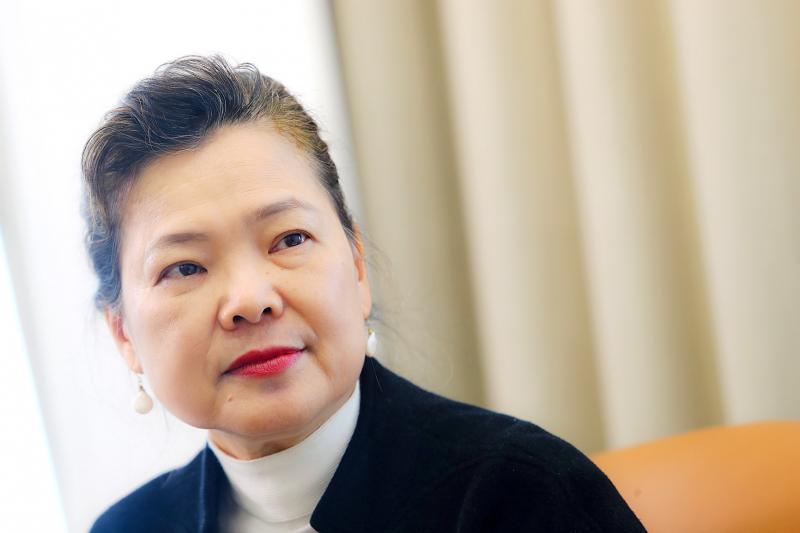The Ministry of Economic Affairs (MOEA) has set up a working group to meet with US representatives at a meeting of the US-Taiwan Economic Prosperity Partnership dialogue early next month, the ministry said yesterday.
Details of the meeting are yet to be discussed with representatives of the new administration in Washington, Minister of Economic Affairs Wang Mei-hua (王美花) said.
In an interview with a local newspaper on Wednesday, Wang said that maintaining a strong relationship with Taiwan has bipartisan support in the US, and that exchanges are unlikely to change under US President Joe Biden.

Photo: CNA
Taiwan and the US in the inaugural meeting of the dialogue on Nov. 20 last year signed a memorandum of understanding to deepen cooperation.
The memorandum is expected to lay the foundation for the dialogue’s high-level meetings, which are to be held alternately in Washington and Taipei.
Through the dialogue, the two nations agreed to set up working groups to cover issues including global health security, science and technology, supply chains, 5G and telecommunications security, women’s economic empowerment, infrastructure cooperation, and investment screening.
The working groups are expected to meet on an ad hoc basis to discuss economic cooperation, the ministry said.
On Monday, Wang said that Biden’s approach would likely differ sharply from his predecessor on major foreign policy issues.
The ministry would also seek to deepen cooperation with US allies, Wang said, adding that under the present circumstances, Taiwan and the US are likely to work to establish deeper ties.

TAKING STOCK: A Taiwanese cookware firm in Vietnam urged customers to assess inventory or place orders early so shipments can reach the US while tariffs are paused Taiwanese businesses in Vietnam are exploring alternatives after the White House imposed a 46 percent import duty on Vietnamese goods, following US President Donald Trump’s announcement of “reciprocal” tariffs on the US’ trading partners. Lo Shih-liang (羅世良), chairman of Brico Industry Co (裕茂工業), a Taiwanese company that manufactures cast iron cookware and stove components in Vietnam, said that more than 40 percent of his business was tied to the US market, describing the constant US policy shifts as an emotional roller coaster. “I work during the day and stay up all night watching the news. I’ve been following US news until 3am

UNCERTAINTY: Innolux activated a stringent supply chain management mechanism, as it did during the COVID-19 pandemic, to ensure optimal inventory levels for customers Flat-panel display makers AUO Corp (友達) and Innolux Corp (群創) yesterday said that about 12 to 20 percent of their display business is at risk of potential US tariffs and that they would relocate production or shipment destinations to mitigate the levies’ effects. US tariffs would have a direct impact of US$200 million on AUO’s revenue, company chairman Paul Peng (彭雙浪) told reporters on the sidelines of the Touch Taiwan trade show in Taipei yesterday. That would make up about 12 percent of the company’s overall revenue. To cope with the tariff uncertainty, AUO plans to allocate its production to manufacturing facilities in

Six years ago, LVMH’s billionaire CEO Bernard Arnault and US President Donald Trump cut the blue ribbon on a factory in rural Texas that would make designer handbags for Louis Vuitton, one of the world’s best-known luxury brands. However, since the high-profile opening, the factory has faced a host of problems limiting production, 11 former Louis Vuitton employees said. The site has consistently ranked among the worst-performing for Louis Vuitton globally, “significantly” underperforming other facilities, said three former Louis Vuitton workers and a senior industry source, who cited internal rankings shared with staff. The plant’s problems — which have not

COLLABORATION: Given Taiwan’s key position in global supply chains, the US firm is discussing strategies with local partners and clients to deal with global uncertainties Advanced Micro Devices Inc (AMD) yesterday said it is meeting with local ecosystem partners, including Taiwan Semiconductor Manufacturing Co (TSMC, 台積電), to discuss strategies, including long-term manufacturing, to navigate uncertainties such as US tariffs, as Taiwan occupies an important position in global supply chains. AMD chief executive officer Lisa Su (蘇姿丰) told reporters that Taiwan is an important part of the chip designer’s ecosystem and she is discussing with partners and customers in Taiwan to forge strong collaborations on different areas during this critical period. AMD has just become the first artificial-intelligence (AI) server chip customer of TSMC to utilize its advanced